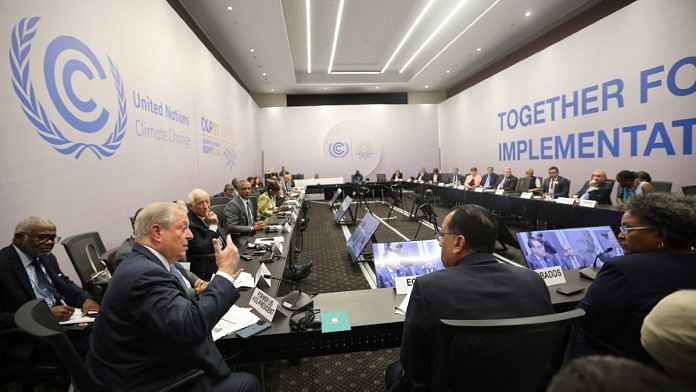Sharm el-Sheikh, Egypt: The COP27 presidency released a draft cover decision – a political document setting the tone of the talks – early Friday, following a night of lengthy discussions. Hopes of a cover decision that will reflect the needs of developing countries are riding high this COP27, which has modelled itself on “implementing” climate action.
The draft cover decision is a text that “gives the Presidency an opportunity to tell their own story of the COP, which hasn’t been negotiated line by line, and also helps lay the foundation for how the COP is perceived,” Sarah Colenbrander, director of think tank ODI’s Climate and Sustainability programme, told ThePrint.
On Thursday, the Presidency compiled a 20-page “non-paper” which included wide-ranging elements, or options, for what could be included in the final version. The draft released Friday morning narrows down these options significantly and also excludes some of the strong points developing countries had put forward in the “non-paper”.
Notably, the draft text excludes the proposal for developed countries to reach net-zero emissions by 2030, expressing “deep regret” that “those who have the most capabilities financially and technologically to lead in reducing their emissions continue to fall short in doing so”.
Instead, the draft text “reaffirms” that limiting global warming “requires rapid, deep and sustained reductions in global greenhouse gas emissions” by 45 per cent to reach net zero “around midcentury”.
The draft text also drops the proposal to offer a wide range of financial facilities to developing countries facing a debt crisis, which is “hindering their efforts to achieve sustainable development and poverty eradication”.
In a midnight intervention late Thursday, developed and developing country aired their disagreements on nearly every issue, particularly about funding for loss and damage and enhancing climate ambition to limit global warming to no more than 1.5 degrees — a mandate that has no basis in the UN Framework Convention on Climate Change or its Paris Agreement, but one that rich countries have been pushing for nonetheless.
Developing countries like Bolivia, along with the African Group of Negotiators, objected to raising climate ambition without an adequate carbon budget and the means to do so, while saying reliance on private finance shifts the burden away from rich countries who haven’t delivered on their pledges.
The text is due to be discussed further, with newer iterations expected throughout the day.
“The presidency has submissions from groups, and has taken on board views from statements on the floor,” said a delegate from a developing country, adding that developing countries will go through the text carefully in the next few hours to “see whether the landing zones proposed work”.
With no consensus on the issues of loss and damage finance or a new quantified goal on climate finance, the cover text reserves a “placeholder” for these contentious issues.
During a press conference, COP27 Ambassador Wael Aboulmagd told reporters the draft cover text was a “work in progress”, and that President Sameh Shoukry was meeting with groups of countries to iron out differences throughout the day.
Also Read: Why definition of climate finance remains a major bone of contention at COP27 talks
No fossil fuel phase down
Earlier this week, India made the provocative proposal to phase down “all” fossil fuels rather than just coal, to emphasise that all fossil fuels resulted in global warming, and not just one. Coal is the most polluting fossil fuel, but also what developing countries rely on the most for their energy security.
Developed countries, on the other hand, rely more on oil and gas for their energy needs.
The proposal, however, didn’t make it to the “non-paper” text of elements or the first draft of the cover text.
In a press conference on 15 November, the European Union (EU) had expressed support for India’s proposal, but only if it didn’t “diminish” the agreement made in Glasgow to phase down coal. In cover text negotiations, India objected to “attempts to single out specific sources of energy”, according to an observer.
The draft cover text reinstates the Glasgow goal.
According to observers, Norway, the United Kingdom, the United States, and Colombia said during cover text talks that global emissions must peak by 2025 — a position that developing countries, including India, said is unfair and “should not shift the burden (of mitigating emissions) from developed to developing countries”.
(Edited by Amrtansh Arora)
Also Read: Midnight meeting at COP27: Countries war over climate policies night before talks set to close



